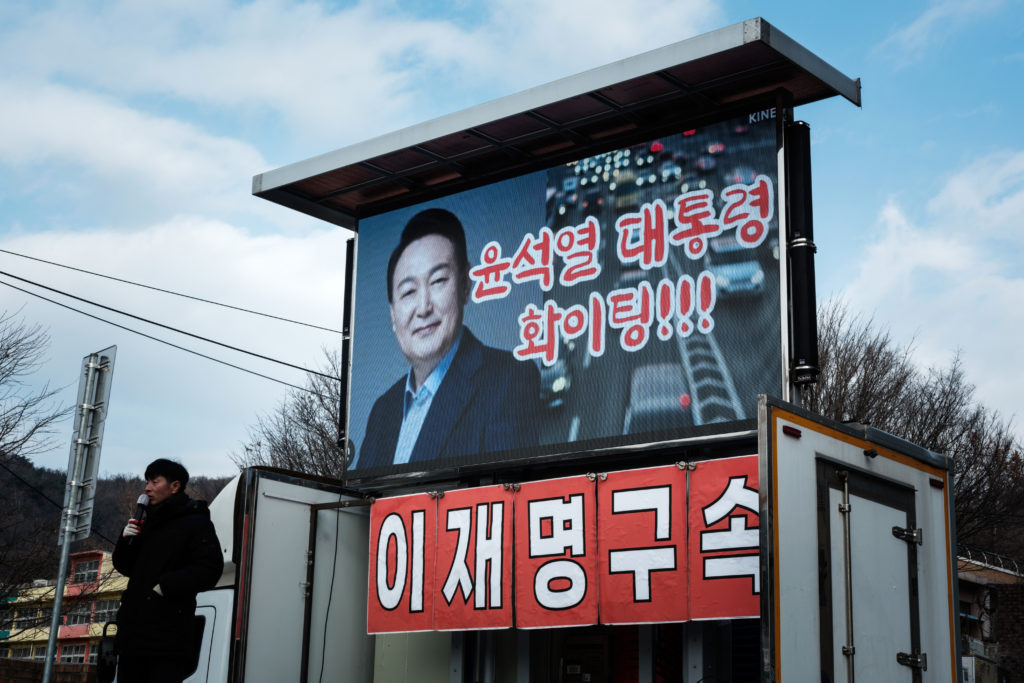South Korea’s Constitutional Court opened the impeachment trial of President Yoon Suk Yeol on Tuesday over his failed martial law bid, but quickly adjourned the first hearing after the suspended leader didn’t show up.Yoon’s December 3 power grab plunged South Korea into its worst political crisis in decades, after he directed soldiers to storm parliament in an unsuccessful attempt to stop lawmakers voting down his suspension of civilian rule.He was impeached soon after and suspended from duty, but has gone to ground in his residence since, refusing summonses from investigators probing him on insurrection charges and using his presidential security team to resist arrest.The trial’s first of five hearings began at 2:00 pm (0500 GMT) but lasted just minutes with Yoon not in attendance, the court’s spokesperson told AFP.Although his failure to attend — which his team have blamed on purported safety concerns — forced a procedural adjournment, the hearings will continue without Yoon, with the next set for Thursday. Additional hearings are already scheduled for January 21, January 23 and February 4.The court’s eight judges will decide mainly two issues: whether Yoon’s martial law declaration was unconstitutional and whether it was illegal — either of which could prove grounds to uphold his impeachment. Six of the eight judges must vote in favour of Yoon’s impeachment for him to be removed from office.The National Assembly’s legal team told reporters in front of the court before the trial began Tuesday that there were “overwhelming reasons for the immediate dismissal” of Yoon.The court has up to 180 days from December 14, when it received the case, to make its ruling.Former presidents Roh Moo-hyun and Park Geun-hye did not appear for their impeachment trials in 2004 and 2016-2017, respectively.Yoon’s lawyers have argued the court must utilise the full 180 days — specifically to examine what “led to the declaration of martial law”.The attempt to place South Korea under military rule for the first time in more than four decades lasted just six hours.”This impeachment case focuses solely on the martial law situation,” lawyer Kim Nam-ju told AFP.”Since most of the individuals involved have already been indicted and the facts have been somewhat established, it doesn’t seem like it will take a long time.”Lawmakers also impeached Yoon’s stand-in last month, adding to the country’s political instability, and the current acting president has appeared unwilling to wade into the standoff, instead urging all parties to negotiate a solution.- Arrest attempt -In a parallel criminal inquiry, a joint team of investigators from the Corruption Investigation Office (CIO) — which is probing Yoon over insurrection — and police are preparing a fresh attempt to arrest the president.An earlier attempt failed after Yoon’s presidential guards blocked access to investigators, while rival camps of protesters rallied outside his home.Yoon’s chief of staff Chung Jin-suk said his office was “ready to consider all options for investigation or visits” to the sitting leader “at a third location”.If the new warrant is executed successfully, Yoon would become the first sitting South Korean president to be arrested.If eventually convicted in that case, Yoon faces prison or even the death penalty. A CIO official told reporters they were “continuing preparations” for the second arrest effort.Police are also reportedly preparing 1,000 investigators for the fresh attempt.Yoon’s guards have reinforced his Seoul compound with barbed wire installations and bus barricades, while a military unit patrols outside.But the defence ministry said Tuesday that the soldier unit would “focus solely on its primary mission of perimeter security in the vicinity of the official (presidential) residence and will not be mobilised during the execution of the warrant”.Experts say much is riding on a successful arrest attempt for investigators and wider South Korean society.”If (the CIO) fails to execute a second arrest warrant, it could face a significant crisis regarding its future,” said Lee Jae-mook, a political science professor at the Hankuk University of Foreign Studies.”If this situation persists, we may witness an increase in social unrest.”
Tue, 14 Jan 2025 06:07:41 GMT










